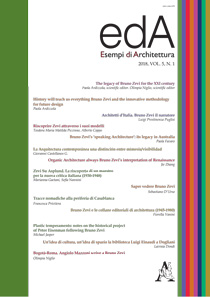Estratto da
ESEMPI DI ARCHITETTURA
International Journal of Architecture and Engineering
Organic Architecture always: Bruna Zevi’s Interpretation of Renaissance
ESEMPI DI ARCHITETTURA
International Journal of Architecture and Engineering
Organic Architecture always: Bruna Zevi’s Interpretation of Renaissance

Despite its ambiguity and multivalency, the concept of organic architecture was crucial to the Italian architect and architectural historian Bruno Zevi. It was deeply related to Zevi’s Jewish identity, longing for a democratic society meanwhile subdued to the Hebrew belief emphasizing time rather than the place. On the other side, believing that history should directly serve the contemporary design, Zevi was long been accused of a biased reading on the buildings in the past, which was meant to illustrate as well as to legitimize the organic architecture. During this course, the reading of the works by the old masters in the Renaissance period emerged as an interesting phenomenon in Zevi’s historiography. Somehow it was twofold. For one thing, there existed several individual architects in the quattrocento that were recognized by Zevi as the forefathers to the contemporary organic architects. For the other, acknowledging the pair of the rising Neo-rationalism in the postwar period and Renaissance architecture in general for the same inhumanity, rigidity, and hegemony, Zevi increasingly criticized the latter in opposition to organic architecture. Nonetheless, these two readings were de facto two sides of the same coin. This paper intends to carry out a brief survey on the process of Zevi’s interpreting Renaissance. It is argued that this interpretation was an enrichment to the idea of organic architecture, which would gradually replace rationalism as the future of the modern movement in Italy.
| pagine: | 49-60 |
| DOI: | 10.4399/97888255150536 |
| data pubblicazione: | Maggio 2018 |
| editore: | Aracne |








